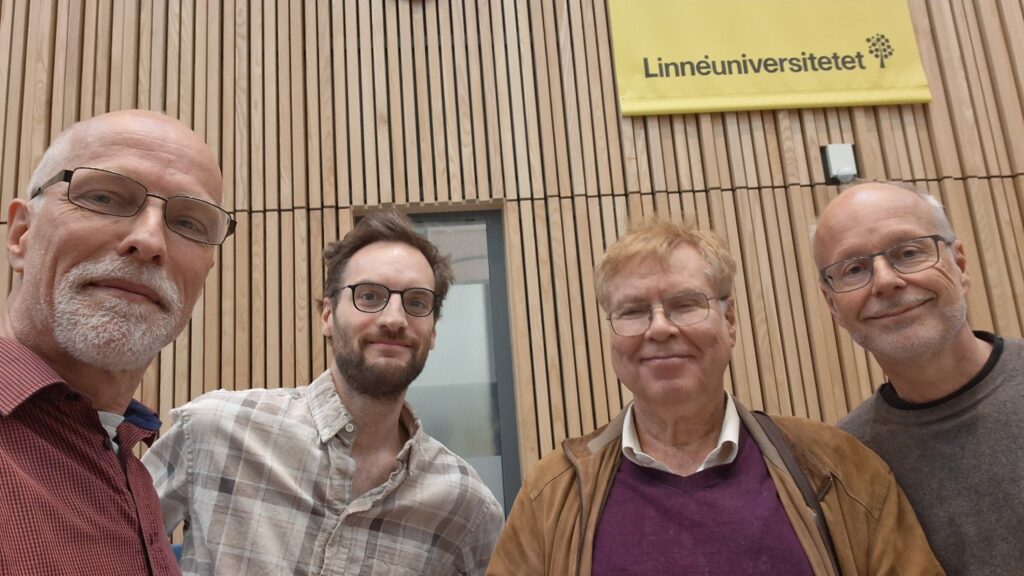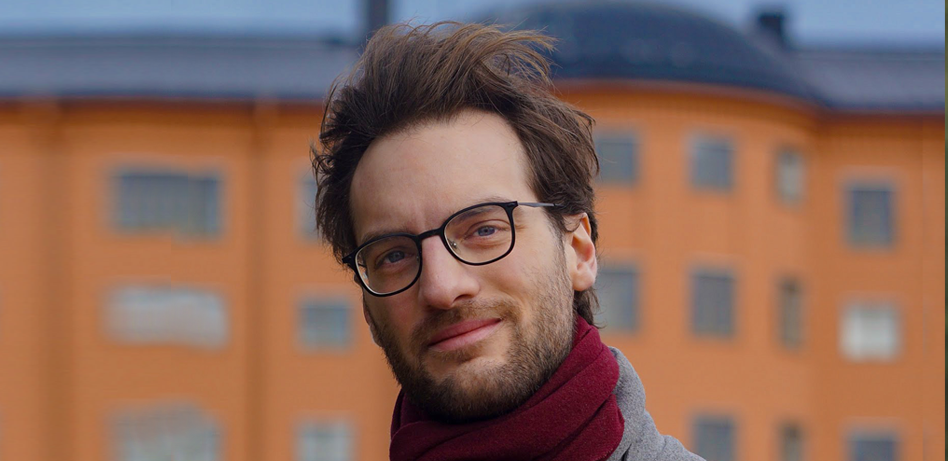Om framtidsskapande
2025-06-18
Artikel i tidskriften Byggnadskultur (som är svenska byggnadsvårdsföreningens tidskrift). In Swedish.


2025-06-18
Artikel i tidskriften Byggnadskultur (som är svenska byggnadsvårdsföreningens tidskrift). In Swedish.


2025-05-22
In May, Anders Högberg was invited as keynote speaker at the National Library of Sweden. The invitation came from their Department for Research and Collection Management, which hosted a joint staff day. Högberg presented his research on heritage processes as futures-making practices. In his presentation Anders emphasised that we need new knowledge in order to rethink futures in novel ways. The discussion that followed on the presentation, largely focused on how we can create change to achieve this, what opportunities it might bring, but also which challenges we need to address in order to succeed.

National Library of Sweden. Photo Maria Aho

2025-05-15
Dr Michael Ranta gave a lecture for us today, entitled “On Communication with Remote Cultures and Questions of Relativism” (15 May 2025).
On the picture from the left: Cornelius Holtorf, Gustav Wollentz, Michael Ranta, Peter Skoglund.

Ranta raised some very fundamental issues on truth, representation, communication and aliens:
How would it be possible to communicate with (remote) future generations, which may have different or altered forms of communication, compared to current ones? Apart from language or other communication alterations over time, new semiotic resources (e.g. resulting from technological or medical innovations) may emerge. Moreover, and most probable, the accumulation and processing of knowledge as well as the emergence of altered world views and category systems, or of paradigm changes (in Thomas Kuhn’s sense), may obstruct the comprehension, transmission, and exchange of information. Future generations may thus be confronted with significant obstacles trying to understand or reconstruct our communicative habits. These topics, especially with regard to communication with pictures, will be further elaborated and discussed in this presentation.
2025-04-28
By Claudio Pescatore
What if the true monuments of the nuclear age are not vaults, vitrified blocks, or warning markers—but fields of invisible light?
In a recent study, I calculated the gamma radiation field unleashed by humanity’s Uranium-238 (U-238) legacy. The results show that this field is not temporary. It is already present, slow to mature, but geologically assured and radiologically significant, beyond safety thresholds.
This raises questions not only of science, but of ethics, inheritance, and imagination:
Nuclear waste lasts a long time. But U-238 isn’t just persistent—it performs. It changes. It regenerates. It returns. And surprisingly, we don’t call it waste. We call it an industrial by-product.
And now we are not just leaving behind a signal—we are leaving a body.
We often speak of the nuclear age as bracketed—confined by Cold War dates or the operational lifespan of reactors. But its material consequences are just beginning. Care begins by acknowledging and tending to what endures.

Read more: http://www.nukleonika.pl/www/back/full/vol70_2025/v70n2p031f.pdf
2025-04-14
Miras Gelecekleri is “Heritage Futures” in Turkish!
I was interviewed by Erman Ertuğrul for the popular Turkish website arkeofili.

In the interview I am talking, among others, on how I got into archaeology at age 10 and then, much later, into future archaeology.
See for the English version: https://arkeofili.com/on-future-archaeology-an-interview-with-cornelius-holtorf/ and for the Turkish version: https://arkeofili.com/gelecek-arkeolojisi-uzerine-cornelius-holtorf-roportaji/
Thank you, Erman!
2025-04-03
Bebyggelsehistorisk Tidskrift (Nordic Journal of Settlement History and Built Heritage): Urban transformation, heritage processes and social sustainable futures by Ulrika Söderström & Anders Högberg.
Short summary:
In this study, we use three case studies to discuss heritage processes as future-building practices. Through examples from urban regeneration processes in three Swedish cities, we discuss how these processes have contributed to social sustainability. The case studies are the Caroli neighbourhood in Malmö (transformed 1967-1973), the Valnötsträdet neighbourhood in Kalmar (transformed 2008-2018) and the ongoing transformation of Kiruna city. Our findings show that the cultural heritage processes activated in urban regeneration processes do not always promote socially sustainable future-making practices. We conclude that an engagement in different forms of future-making is crucial for heritage processes to contribute to long-term sustainable urban development. We suggest that this requires a way of thinking and acting that includes change and transformation. Our findings are conceptualised in a model that we hope can be used to understand heritage processes as future-making practices in urban transformation projects.
Bebyggelsehistorisk Tidskrift is a Nordic forum for research and debate on the history of the built environment. It is the Nordic region’s leading academic journal on the history of the built environment. The periodical presents the latest research on the history of the built environment, and also provides a forum for discussing the discipline in practice when buildings and heritage environments are being conserved.
https://bebyggelsehistoria.org/en/bebyggelsehistorisk-tidskrift-english/
Open access (Doctoral Thesis by Ulrika Söderström) https://lnu.diva-portal.org/smash/record.jsf?pid=diva2:1901953
————————
POSTSCRIPT 13 April 2025. Here is a graphical summary of the paper prepared by ChatGPT:

2025-04-02
Cornelius Holtorf took part in the first meeting of the Heritage and Climate Change Working Group of the ICOMOS International Scientific Committee on Interpretation and Presentation (ICIP) (14 January 2025).
Cornelius Holtorf lectured on “Communicating Cultural Heritage with the Future” for 15 students reading the course “Cultural Heritage and Communication” as part of the Undergraduate Programme in Cultural Heritage in Present and Future Socities at Linnaeus University, Kalmar, Sweden (5 February 2025).
Cornelius Holtorf lectured on “Unesco världsarv: vad kommuniceras för framtida generationers skull?” for 15 students reading the course “Cultural Heritage and Communication” as part of the Undergraduate Programme in Cultural Heritage in Present and Future Socities at Linnaeus University, Kalmar, Sweden (10 February 2025).
Cornelius Holtorf participated in a short survey on the illicit trafficking of cultural property, with a particular focus on its online dimension, shaping discussions at the upcoming UNESCO Conference “Addressing Illicit Trafficking of Cultural Property in the Digital Era” to be held at UNESCO Headquarters in Paris on 26 June 2025 (15 February 2025).
Cornelius Holtorf had an informal meeting with Ulrik Brandén, Deputy Mayor of Mörbylånga, Emma Rydnér, World Heritage Coordinator at Mörbylånga Municipality, and Örjan Molander, Director at Kalmar County Museum, on various ideas for collaboration regarding development of the UNESCO World Heritage property Agricultural Landscape of Southern Öland (20 February 2025).
Cornelius Holtorf took place in the regular meeting of the International Scientific Committee on AeroSpace Heritage of the International Council of Monuments and Sites (ICOMOS) which discussed, among others, the recent listing of the sites on the Moon on the World Monuments Watch List 2025 by the World Monuments Fund (21 February 2025).
Cornelius Holtorf attended the 8th Annual Heritage Lecture of the Cambridge Heritage Research Centre on ”Changing concepts Future of the and the ’Ethics of Repair’”, given by Aleida Assmann, Professor of English Literature and General Literary Studies, Universität Konstanz (28 February 2025).
Cornelius Holtorf presented a keynote lecture on “Time Travel – More than Learning About the Past” for ca 50 listeners in the room and another 20 online, coming together for the conference Re-Action: Time Travels in a Changing Worl – Bridging Ages 20 Years in Kalmar, Sweden (4 March 2025).
Cornelius Holtorf had an informal meeting with Steven Hartman, Executive Director of the BRIDGES Sustainability Science Coalition in UNESCO’s Management of Social Transformations Programme (MOST), on ways of future collaboration (7 March 2025).
Cornelius Holtorf met with Shanti Morell-Hart of the Dept of Anthropology at Brown University in Providence, USA, for an informal conversation about seeds and heritage futures (14 March 2025).
Cornelius Holtorf met in Providence, USA, with Philip Segadika of the National Museum of Botswana in Gaborone, Botswana, for an informal conversation about collabloration on heritage futures (16 March 2025).
Cornelius Holtorf participated actively discussing heritage processes and futures literacy in the first Plenary Meeting of the Expert Group on Archiving and Awareness Preservation (EGAAP-1) of the Nuclear Energy Agency held online and at the OECD in Paris (19-20 March 2025).
2025-03-24
Anders Högberg held a keynote lecture at the conference “Kulturarvsforskning i Sverige 2025” – Cultural Heritage Research in Sweden 2025, organised by the Swedish National Heritage Board 20-21 March 2025 in Stockholm. Keynote paper: ‘Cultural heritage research 2025 – some thoughts on where we stand and questions for the future’.
Ulrika Söderström also presented her dissertation at the conference: “Cultural heritage as a resource in socially sustainable urban development: A designed living environment for the future”.
More about the dissertation here
Kulturarvsforskning i Sverige 2025 -Riksantikvarieämbetet (The Conference Programme in Swedish)


2025-03-17
I was able to develop some thoughts on natural heritage futures as an invited speaker at the conference From Menageries, to Zoos, to Everything in Between: Can we Envision a New Breed of Zoos? held at Brown University in Providence, USA (15 March 2025) for ca 50 attending participants.

My contribution was as follows:
Zoos and natural heritage futures
This talk is about zoos and the roles of natural heritage in managing the relations between present and future societies. I will present several ways in which zoos can contribute to raising significant issues that directly address anticipated needs of future societies. This includes questions on what it means to be human, the relations between human and non-human lifeforms, and how to make sense of a changing world through animals. That world will face the following challenges, among others:
Zoos remain significant in the future because they can be creating opportunities for engaging people in stories about what it means to be human and about a variety of ways for human societies of relating to the natural world.
2025-03-03
On the 25th of February 2025 Gustav Wollentz presented and participated in a panel discussion at the conference “The Houses, the History, and the Future” (Husen, historien och framtiden) that was organized in Gothenburg by Gothenburg University and multiple other partners in the region. There were around 140 heritage professionals attending the conference, mostly working with, and researching on, the conservation and restoration of buildings.
Gustav contributed to the final part of the conference, where future challenges and opportunities were in focus. Gustav presented the work on Strategic Foresight he has been carrying out together with ICCROM, including the Horizon Scanning looking 15 years ahead, and the work for the pan-European ARCHE project, with the goal to produce a new Strategic Research and Innovation Agenda for Heritage in Europe.
In the presentation, Gustav focused on four specific opportunities for action related to future change:
The presentation and panel discussion were very well received and there was a large interest to further explore Strategic Foresight.
For those interested in the ICCROM Horizon Scanning, it is available here: https://www.iccrom.org/publication/anticipating-futures-heritage
For those interested in the Foresight-work within the ARCHE project, the report is available here: https://www.heritageresearch-hub.eu/app/uploads/2024/04/ARCHE_D2.1_Report-on-Future-Trends-on-Cultural-Heritage-RI-3.pdf

[…] The new funding for this and a number of additional smaller projects, means that the Climate Heritage Network is…
[…] Chair on Heritage Futures « Culture, cultural heritage and COP26 […]
[…] mer på Unescoprofessurens blogg http://blogg.lnu.se/unesco/?p=1061 Besök Öland 2050! […]